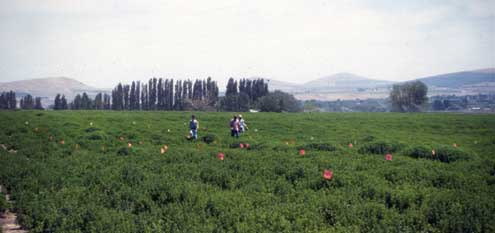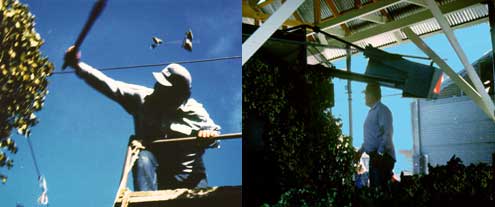Hop workers at harvest (left) and operating a picking sorting machine (right)
Impacts on a Human Level
The sociological impacts of producing and marketing a commodity are an integral component of that commodity's sustainability. Sociologist Dr. Jennifer Sherman and research assistant Elizabeth Harris of Washington State University have been working to to assess the impacts of agricultural stresses and market fluctuations on individuals, families, and communities associated with mint and hop cropping systems. Through interviews and subsequent analysis, they seek to understand on a qualitative level whether sustainable agricultural practices have observable impacts on community systems where these commodities are produced.
Background
Sociological impacts of employment trends are well documented. The latter half of the 20th century was characterized by rapid deindustrialization and catastrophic job loss throughout much of rural America. Communities that were dependent on natural resources, extractive industries, and manufacturing were the hardest hit. These trends included the loss of manufacturing jobs in the rural Northeast and Midwest, declines of farm ownership and employment in the Midwest, West, and South, declines of extractive industries throughout Appalachia and the Midwest, and declines in fishing and forestry along the nation’s coastlines. These changes have been accompanied by a shift toward the replacement of full-time, well-paid work by part-time, low-wage, and often feminized work. Industrial restructuring throughout rural America has resulted in unemployment, under-employment, poverty, and changing workforce demographics, as well as changing social, family, and gender relations. These social trends have resulted in the destabilization of both rural communities and rural families, often with disastrous effects for both. These trends have not, prior to this project, been studied in communities specifically impacted by hop and mint production.
Process and Progress to Date
Our sociologists have completed 52 interviews with farmers, farmworkers, community members, and others who work in the hops and mint industries. These include 15 hops and mint farmers and 5 farm workers who were interviewed in the Yakima Valley in 2010, as well as an additional 8 hops farmers in the Willamette Valley and 24 community members in the Yakima Valley who were interviewed in 2011. Interviews with community members were conducted by a research assistant who spent the Spring 2011 semester living and working in the Yakima Valley. Significant ethnographic observation was conducted in addition to the interviews. Audio files and field notes were taken and have been transcribed for analysis.
Comparing and contrasting perspectives between hop growers/workers in the Yakima Valley and those in the Willamette Valley has provided a useful body of data thus far, bringing to light number of important differences in pesticide use patterns and other practices, as well as differences in attitudes about the industry.
In addition to formal interviews, our sociologists have also engaged in informal conversations with contractors and others connected to the hops industry in both the Yakima and the Willamette Valleys, and have taken field notes on these interactions. They are continuing to speak with and pursue contacts in the Yakima Valley throughout the summer and fall of 2011, and they expect to complete several more interviews before the calendar year is finished.
Next Steps
With the completed interviews transcribed and the addition of interview data from the remainder of 2011, data analysis will begin. The resulting research will be prepared for publication beginning in 2012.

Mint field near Granger, Washington
Highlights
- 52 interviews completed
- growers
- workers
- community members
- others in hop & mint industries
- 23 hops & mint farmers
- 15 Yakima Valley
- 8 Willamette Valley
- 5 hops/mint farmworkers
- 24 community members
- Ethnographic observations
- Conversations with contractors and other industry stakeholders
- Interviews transcribed
- Publication preparation to begin in 2012
